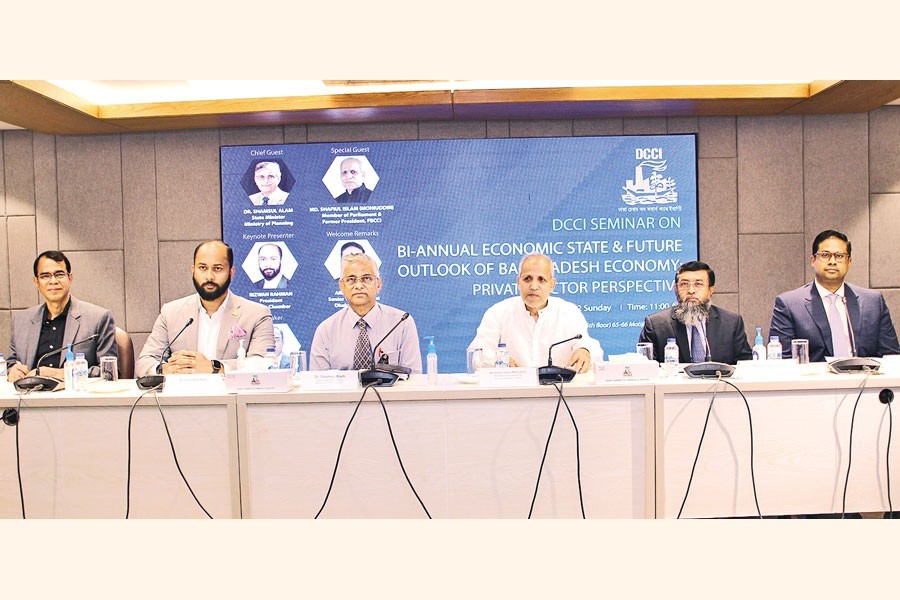Bangladesh's steadily-growing economy is under pressure for disruption to global supply chain for external disturbance, experts alert and say food security facing 'threat' amid high inflation.
Rising cost of production and transportation following fuel-price hike is further worsening the situation on the economic front, they told a seminar organised Sunday by Dhaka Chamber of Commerce and Industry (DCCI) at its office.
The disruption is not only intensifying the cost of energy and logistics but also putting pressure on the country's foreign-exchange reserves.
As a spillover effect, the production cost has gone up significantly and it keeps the inflation and food security under threat, according to them.
Under such circumstances, they called upon the government to take necessary precaution, keeping industrial production unharmed, so that the fallout is not too severe.
Simultaneously, they also urged the people of all segments of society not to panic much as the economic "stress is temporary", stemming from sudden adversities like the pandemic and the Ukraine war.
The speakers made the observations as the seminar on 'Biennial Economic State and Future Outlook of Bangladesh Economy: Private Sector Perspective' shed light on the economic situation at this juncture of a worldwide crisis.
Presenting keynote paper, DCCI president Rizwan Rahman said energy, inflation, food security, logistics and financial sector emerged as the most stressing areas of the economy which the policymakers should seriously look into.
Recently liquid fuel price is hiked nearly 50 per cent and natural gas price raised by 22.78 per cent whereas inflation was recorded 7.48 per cent in July'22. Moreover, disruption to global trade affected essential food supply and reserve crisis forced an increase in external borrowing, he noted.
Presenting statistics, he said the country's export from January to June FY'22 was US$27.39 billion but the import was calculated at US$48.16 billion-and it shows positive growth.
During the same period, he said, inflation and private-sector credit growth were registered 7.56 per cent and 13.66 per cent while remittance and foreign reserves were recorded US$10.79 billion and US$41.8 billion respectively.
All these components showed positive growth except for the reserves and inflation as the reserves were US$46.15 billion from July to December FY'22, he said. Due to global crisis resulting from the Ukraine-Russia war, energy-supply chain has been disrupted, exchange rate of Taka depreciated and trade deficit stood at US$40.15 billion in FY2022.
"Additional cost in the supply chain needs to be lessened to control the food inflation. International market and price dynamics need to be monitored to avoid irrelevant price shock," the DCCI president suggests.
Mr Rahman also suggests ensuring a flexible interest-rate regime to reduce inflationary pressure and stabilize forex reserves.
For boosting export revenue from non-RMG sectors, he stresses replication of the successful RMG model to other potential export-earning sectors.
Speaking as the chief guest, State Minister for Planning Dr Shamsul Alam said not only the Bangladesh economy but the whole world is going through a tough time in terms of economic stress, inflation, fuel-price hike and supply-chain disruptions.
"Bangladesh is not an exception to this global economic chain, but we are not in a position to get panicked at all," he told the meet.
He makes a point that there are some people who have intentionally been trying to spread panic comparing Bangladesh with the trouble-hit Sri Lanka as the next general election comes close.
"They want to create hype that the governance system is completely collapsed. It's a coordinated political effort. There is no scope to put our foot on their trap. The pressure comes from the external factors and the government is efficiently handling this," the state minister said.
Giving some statistics, he said the manufacturing sector saw a 23-percent growth in the last fiscal while per-capita income rose to US$ 2824 and the World Bank projected the country's economic growth to be 6.7 per cent in this fiscal, which is second-highest in South Asia.
"Facts and figures show that the economy of Bangladesh is on right track and there is no scope for being panicked," he said, adding that the government should take loan from foreign sources to ease pressure on the dollar.
Lawmaker and former FBCCI president Md. Shafiul Islam Mohiuddin said countries all across the globe are facing fuel crisis. For more onshore gas exploration, the country needs to strengthen BAPEX.
"Even in the crisis time, our reserve is enough to pay import bills of next five and a half months. The existing crisis is temporary and the government is managing all these things in an efficient manner."
Executive President of BKMEA Mohammad Hatem said low pressure of gas badly impacted the industrial production that may hamper the country's export-competitiveness.
"Recent diesel-price hike will inevitably increase the inflation, no doubt, but the government should take initiative of adjusting fuel price quarterly matching with the prices in the international market," he said.
Criticising the banks' role in making the trade in US dollar volatile, he said banks bought the greenback at the rate of Tk 95. But when they opened LCs (letter of credits), the bank charged them Tk 105.
"Why the difference between buying and selling of dollar should be 1 taka?" The export-industry leader posed the question.
Chief Economist of Bangladesh Bank Dr Habibur Rahman said any policy issue has some conflicting sides. But the central bank is always looking into best balancing of policy guidelines to control the normal money circulation and market.
"We are also thinking about options for currency swap with few countries like India and China," the central banker told his business audience.
DCCI Senior Vice-President Arman Haque, among others, also spoke at the seminar.


